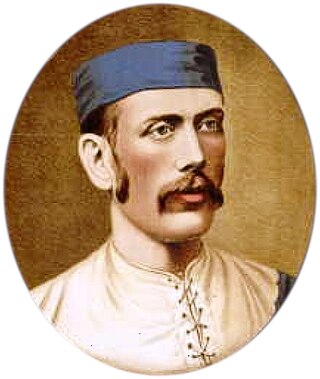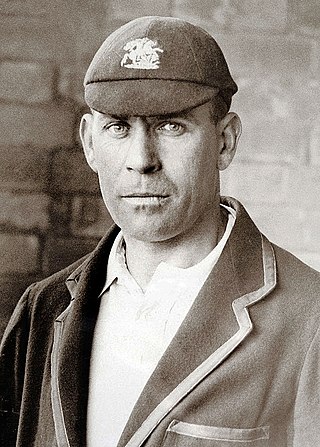Related Research Articles

The Wales national football team represents Wales in men's international football. It is controlled by the Football Association of Wales (FAW), the governing body for football in Wales. They have been a member of FIFA since 1946 and a member of UEFA since 1954.

Alan Lauder Morton was a Scottish footballer who played as an outside left for Queen's Park, Rangers and Scotland.

James McMullan was a Scottish football player and manager. He won 16 Scotland caps as a player at half-back and was part of the famous "Wembley Wizards" side of 1928.

George Coulthard was an Australian cricketer, umpire and Australian rules footballer.

Elias Henry Hendren, known as Patsy Hendren, was an English first-class cricketer, active 1907 to 1937, who played for Middlesex and England. He also had a concurrent career as a footballer and had a long tenure with Brentford F.C. He was born in Turnham Green and died in Tooting Bec. A right-handed batsman who occasionally bowled off breaks, Hendren was one of the most prolific batsmen of the inter-war period, averaging 47.63 in his 51 Test matches and 50.80 in all his first-class matches. He has the third highest first-class run aggregate of 57,611 runs, and his total of 170 centuries ranks second only to Hobbs, who was a personal friend. Hendren was a noted wit, a keen practical joker and had a talent for mimicry.
The following are events in the 1850s decade which are relevant to the development of association football. Included are events in closely related codes, such as the Sheffield Rules. All events happened in English football unless specified otherwise.

St Helen's Rugby and Cricket Ground, commonly known simply as St Helens Ground, is a sports venue in Swansea, Wales, owned and operated by the City and County of Swansea Council. Used mainly for rugby union and cricket, it has been the home ground of Swansea RFC and Swansea Cricket Club since it opened in 1873.

Frederick Spiksley was an English footballer and coach, who played as a forward for Sheffield Wednesday and England. He also played for Gainsborough Trinity, Glossop North End, Leeds City, Watford. After retiring as a player in 1906, he worked as a coach and won national league titles in Sweden, Mexico and Germany. During the First World War he was arrested but escaped from a German Police prison.
Ernest Robert Curtis was a Welsh professional footballer who played as an outside forward. Born in Cardiff, he joined hometown side Cardiff City in 1925, initially as an amateur before turning professional a year later. He made his senior debut in 1926 and helped the side win both the FA Cup and Welsh Cup in his first season. In the club's 1927 FA Cup victory, he became the youngest player to appear in a final in the competition's history as Cardiff defeated Arsenal, remaining the only team from outside England to win the trophy.

Frank McMillan was an Australian rugby league footballer and coach. He was a full-back for the Australian national team and played in nine Tests between 1929 and 1934, two as captain. McMillan has since been named amongst the nation's finest players of the 20th century.
John William Barker was an English footballer who played 327 league games for Derby County and won 11 England caps. He later managed Derby County and Bradford City.

Lawrence 'Larry' Quinlivan Bulger was an Irish rugby union player, athlete and doctor. Bulger played international rugby for Ireland and in 1896 was chosen to represent a British Isles XV in their tour of South Africa. Bulger, who was nicknamed "Fat Cupid", was described as an elusive runner and a devastating tackler, one of Ireland's outstanding players.
Graham McMillan is an Australian former football (soccer) player.
In association football, the FIFA eligibility rules are the eligibility criteria established by FIFA, the sport's governing body, to facilitate the selection of representative teams for international competitions. Specifically, FIFA maintains and implements rules determining a player's eligibility to represent a particular national team in officially sanctioned international competitions and friendly matches.
Thomas Lewis was a Welsh international footballer. He was part of the Wales national football team, playing 2 matches. He played his first match on 26 February 1881 against England and his last match on 14 March 1881 against Scotland.
John Roberts was a Welsh international footballer. He was part of the Wales national football team between 1881 and 1882, playing 2 matches. He played his first match on 14 March 1881 against Scotland and his last match on 25 March 1882 against Scotland.
References
- 1 2 "TwoBuses".
- 1 2 "Wales player database 1872 to 2013". eu-football.info. Retrieved 30 April 2016.
- ↑ "14 March 1881 at the Racecourse, Wrexham". welshsoccerarchive.co.uk. Archived from the original on 31 October 2023. Retrieved 14 November 2024.
